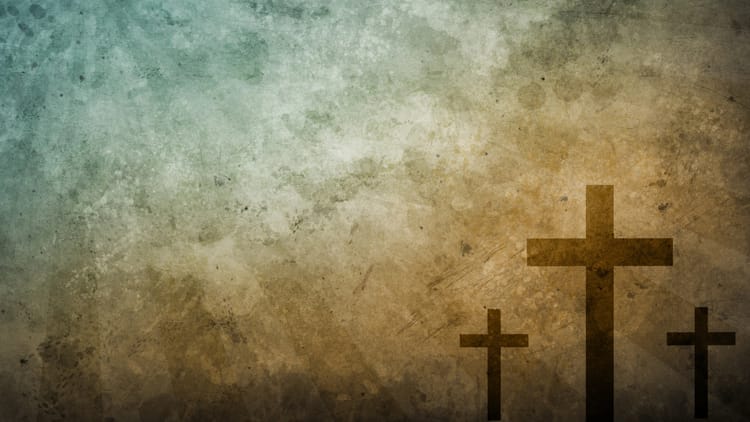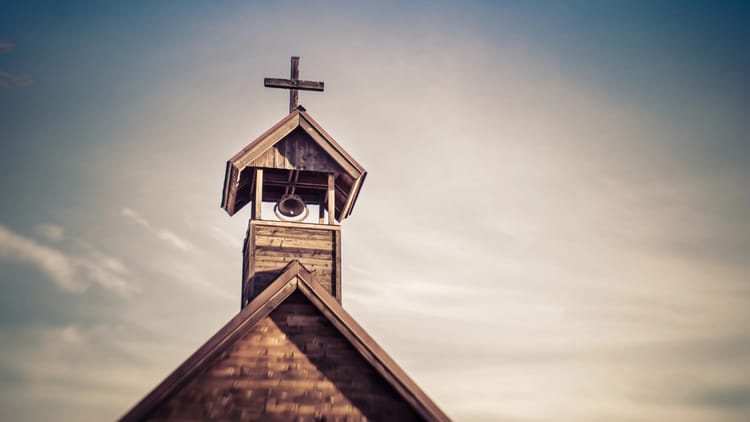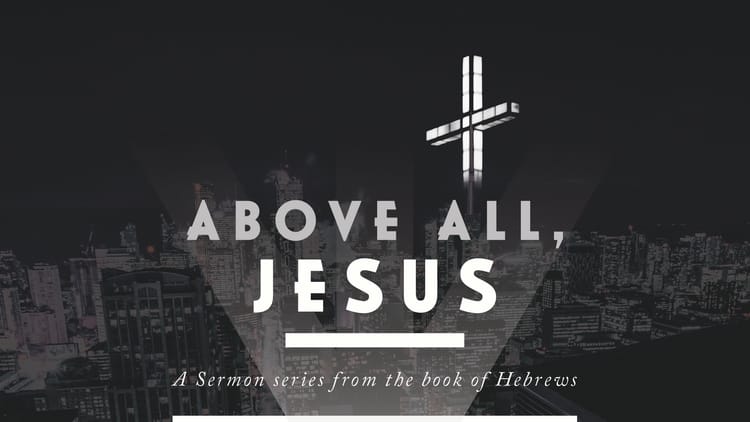A Better Sacrifice (Hebrews 9:1-10:18)

Big Idea: Jesus’ sacrifice deals decisively with the enormous offense of our sins.
At the heart of the Jewish and Christian faiths is something that is troubling to the human mind.
At the heart of the Jewish faith is the temple with all of its sacrifices. If you read the book of Leviticus, you discover all kinds of sacrifices of all kinds of animals for all kinds of occasions. You have five different kinds of sacrifices, a parade of bellowing animals being butchered on the altar.
Imagine the sensory overload of this experience—the violent resistance of the animal, the spurting of blood, the feel of pulling the animal apart, the smell of its burning flesh and bones. Imagine the emotional and spiritual impact of offering this sacrifice, knowing that it was your sin that made this death necessary. And imagine the frustration in knowing that you’ll be back tomorrow or next week because you will sin again. (Nancy Guthrie)
The tabernacle, and later the temple, were slaughterhouses. Jewish texts refer to priests wading knee-deep in blood. The ancient historian Josephus said that in one Passover he observed the slaughter of 256,500 lambs. Picture the blood, the smell, the noise of these sacrifices going on every day.
Christianity also has a sacrifice at its center. At the center if Christianity is a cross. We’ve sanitized the cross. We wear it on necklaces and get cross tattoos. But the cross was a terrifying instrument of torture and execution. John Stott writes, “The cross will always constitute an assault on human self-righteousness and a challenge to human self-indulgence. Its ‘scandal’ (stumbling-block) simply cannot be removed.”
The cross is so offensive that the idea of penal substitution — that Jesus took the full punishment for our sins as a substitute in our place — is rejected by many because they struggle with the idea that God would be so angry at sin, and that he would require a sacrifice to turn away his wrath.
Here’s what I’m trying to get at: both the Jewish faith and the Christian faith have sacrifice at the core, an idea that strikes people today as strange and offensive.
But here’s the message of the passage that we just read: we need a sacrifice in order to be right with God.
Hebrews is written to a group of Christians who were tempted to drift back to Judaism because of how hard it was to live as a Christian. He’s just finished explaining how Jesus is better than the Old Testament rest, the Old Testament priesthood, and the Old Testament covenant. In fact, he’s said that the old covenant is obsolete. In Hebrews 8:13, he said: “In speaking of a new covenant, he makes the first one obsolete. And what is becoming obsolete and growing old is ready to vanish away.”
Here’s what the writer wants us to know in this long section that we just read. He wants us to understand two points.
The Jewish system communicates some important truths (9:1-10).
That’s the first thing that he says, and it comes up a number of times in this passage. In Hebrews 9:1-10, the writer gives us a crash course on the basic features of the Jewish system. He doesn’t list everything, but he lists three components:
- a place (9:2-5) — You have a temple with two sections, each section having some key pieces contents that were full of symbolism to represent God’s presence and his salvation of Israel
- an offering (9:6-7) — In the first room, the priests did certain things like replace the showbread and trim the wicks. But in the second room, the high priest went once a year to offer sacrifices for “for himself and for the unintentional sins of the people” (9:7).
- a limit (9:8-10) — But you also have a built-in limit to the Jewish system. Verses 7 and 8 talk about the infrequency of access. Only one person could access the Holy of Holies, and that person could only enter one year. Baked into this system are limitations. As verses 9 and 10 say:
According to this arrangement, gifts and sacrifices are offered that cannot perfect the conscience of the worshiper, but deal only with food and drink and various washings, regulations for the body imposed until the time of reformation.
Every year, sacrifices would be made for their sins. They did it because God commanded. But it really didn’t deal with the guilty consciences of the worshiper. It pointed the reality of sin and its seriousness. It pointed to death as the consequence of sin. Sin brings and demands death. It pointed to God’s gracious gift of a substitute, allowing another life to be offered on our behalf.
So it teaches some important lessons, but it didn’t really deal with their guilty consciences. As one song puts it:
Not all the blood of beasts
On Jewish altars slain,
Could give the guilty conscience rest
Or wash away one stain.
The Jewish system communicated some truths — the seriousness of sin, death as a consequence of our sin, and God’s gift of a substitute — but it could never really deal with our guilty consciences.
But here’s the second thing that the writer wants us to know.
Jesus’ sacrifice is better (9:11-10:18).
There is so much here, but here’s his essential point: what the Jewish system couldn’t do to deal with our sins, Jesus has done. In fact, he lists five ways that Jesus’ sacrifice for our sins is better:
First: Jesus’ sacrifice was made in a better location (9:11)
But when Christ appeared as a high priest of the good things that have come, then through the greater and more perfect tent (not made with hands, that is, not of this creation)…
The Holy of Holies in the tabernacle only represented the presence of God. But Jesus didn’t enter the earthly tent like the high priests did. He entered the heavenly tabernacle itself.
Jesus did not just slip into the Most Holy Place amidst a protective cloud of incense to breathlessly perform a ritual sprinkling and then exit until next year. Instead, he came having given his own precious blood once and for all, and there he sat down at the right hand of the Father—never more to leave. (Kent Hughes)
Second: Jesus’ sacrifice was more valuable (9:12-14).
Not only did he make his sacrifice in the real Holy of Holies, but he made a much better sacrifice there:
…he entered once for all into the holy places, not by means of the blood of goats and calves but by means of his own blood, thus securing an eternal redemption. For if the blood of goats and bulls, and the sprinkling of defiled persons with the ashes of a heifer, sanctify for the purification of the flesh, how much more will the blood of Christ, who through the eternal Spirit offered himself without blemish to God, purify our conscience from dead works to serve the living God.
Jesus didn’t have to enter the Holy of Holies every year to make an offering. He did this one time, once for all. Why? Because he didn’t come with the blood of goats or bulls. He offered himself for our sins. No greater sacrifice could be made. He has paid the price to set us free. His blood is enough to purify our consciences before a holy God.
No other sacrifice could have dealt with our sins once and for all other than the blood of Jesus. Jesus just had to make one sacrifice to secure our eternal redemption. If you come turn to him and trust him, his one sacrifice is enough to deal with all of your sins.
Jesus’ sacrifice was made in a better location. Jesus’ sacrifice was valuable. But there’s more:
Third, Jesus’ sacrifice enacted a new covenant (9:15-22).
Of all the points the writer makes, this one may be the hardest to understand. Let’s see how we do.
In order for some things to be enacted, a death has to take place. A couple examples are a covenant and a last will and testament. We’re more familiar with the last will and covenant.
If someone writes you into their will, you don’t get anything until they die. If you go to a lawyer with someone’s will naming you as a beneficiary, you get nothing unless the person dies first.
Hebrews 9:16-17 makes this point:
For where a will is involved, the death of the one who made it must be established. For a will takes effect only at death, since it is not in force as long as the one who made it is alive.
Just like a last will and testament only occurs when a death has taken place, so does a covenant. That’s why in Exodus 24, when Moses gave Israel the covenant, and the people agreed, sacrifices were made. The old covenant was established with blood. To enact the covenant, “he took the blood of calves and goats, with water and scarlet wool and hyssop, and sprinkled both the book itself and all the people, saying, ‘This is the blood of the covenant that God commanded for you’” (9:19-20). Until blood is shed, you don’t have a covenant.
So how do we get to the new covenant? Whose blood is going to be shed to enact the new covenant that God is making with us? On the night when Jesus was betrayed, he took the cup and said, “This cup is the new covenant in my blood. Do this, as often as you drink it, in remembrance of me.” (1 Corinthians 11:25). Every time we celebrate communion, as we did today, we remember that the covenant was established on blood, except this time it’s not the blood of bulls and goats but a covenant enacted on the blood of Jesus himself.
When Jesus shed his blood, he became mediator of a better covenant. That’s what makes Jesus’ sacrifice for our sins better than the Old Testament sacrifices, because it inaugurates a better covenant.
Fourth: Jesus’ sacrifice is sufficient and final (9:23-28, 10:11-14).
This is a little easier to understand. The parade of animals was ongoing. The sacrifices were never done because they never dealt finally and fully with sin. But when Jesus’ died for our sins, his sacrifice as sufficient and final for all who trust in him.
But as it is, he has appeared once for all at the end of the ages to put away sin by the sacrifice of himself. And just as it is appointed for man to die once, and after that comes judgment, so Christ, having been offered once to bear the sins of many, will appear a second time, not to deal with sin but to save those who are eagerly waiting for him. (9:26-28)
Christ’s death dealt with your sins fully and finally. Nothing more needs to be done. When he comes again, it will not be to offer another sacrifice or to exact one from you. It will be to grant final salvation for those waiting for him.
Think about that term: “put away sin” in verse 26. You know those sins that bother you? Jesus has put them away where nobody can find them anymore. It’s a hard thing to put away sin. The Old Testament sacrifices — thousands and thousands of bulls — couldn’t do it. Our own efforts couldn’t do it. But Jesus has done it. You can come to Jesus with all of your sins, and he will put them away.
Jesus’ sacrifice is sufficient and final. This is such an important point that he returns to it later in chapter 10:
And every priest stands daily at his service, offering repeatedly the same sacrifices, which can never take away sins. But when Christ had offered for all time a single sacrifice for sins, he sat down at the right hand of God, waiting from that time until his enemies should be made a footstool for his feet. For by a single offering he has perfected for all time those who are being sanctified. (10:11-14)
Think about the priests showing up day after day to sacrifice animals. Tony Evans observes that Old Testament priests were fighting a losing battle. Jesus did in one moment what all of them together couldn’t do over millennia. “The Old Testament sacrifices only had a one-year warranty,” says Evans. “But Christ’s sacrifice was eternal and, therefore, obtained lasting redemption.” By a single sacrifice he has done everything necessary to accomplish our salvation.
We’ve covered a lot. Jesus’ sacrifice was made in a better location; it was more valuable; it enacted a new covenant; it was sufficient and final. There’s one more way that Jesus’ sacrifice is better.
Finally: Jesus’ sacrifice was voluntary (10:1-10).
In all the history of sacrifices, not one bull or goat volunteered. But Jesus volunteered. Jesus was not an unwilling victim. He willingly took our place. He applies the words of Psalm 40:6-8 to Jesus in 10:5-7.
He willingly, consciously, and intentionally gave his body for his people. This is another contrast with animal sacrifices. A lamb does not wake up in the morning and think to itself, “I’d like to die for sinners today.” Christ, unlike a lamb, did not die because he was forced into it; he went forward willingly. That is the picture of love. He was not just given for you; he gave himself for you. The sacrificial system was impersonal, distant, external—it was easy for it to become just a matter of performing the rites. But Jesus offered himself out of love. It was personal. (Michael Kruger)
That’s what the writer wants us to know. Jesus’ sacrifice deals decisively with the enormous offense of our sins.
The Jewish system communicated some important truths we need to understand about the God’s presence, the damage that sin does, and his gracious gift of a substitute. But it could never get the job done. Jesus’ sacrifice is so much greater for all the reasons he mentions. He has made the final sacrifice that deals fully and finally with our sins.
At the heart of the Jewish and Christian faith is something disturbing: sacrifice. There is no part of the biblical faith that is more ugly or jarring than killing animals to take care of your sin. It offends our sensibilities.
But it teaches us that our sin is so unbelievably ugly that it took the most vicious kind of death for us to see it. Take just one of your sins. Think about the cost of that single sin. That single sin alone is enough to warrant death. Now think of all of your sins. Think of the weight of them at their ugliest and worst. How could God forgive us for all that he has done?
And the answer comes back: through the sacrifice of his Son who gave his life in our place and dealt fully and finally with our sins, putting all of them away. There’s no greater sacrifice. There’s no greater Savior.





